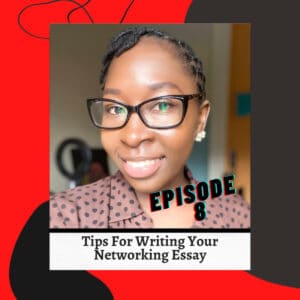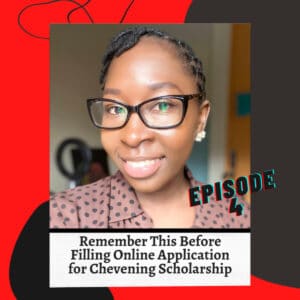In my last two posts, I shared tips on how to prepare for the Chevening Scholarship interviews and also provided you with a list of sample questions that I compiled from what I was asked and what different scholars have also been asked in their interviews in the past.
The feedback I got from the two articles was overwhelming as you found them authentic and informative as they drew from my personal Chevening Scholarship experience.
As you prepare for the face to face or video interviews, I highly recommend that you prioritise doing a mock interview to practise how to answer the anticipated questions.
Get the sample questions from this article and approach a family member or friend who you trust to be candid with you, to role play as an interviewer.
A mock interview is not only essential in helping you answer the interview questions concisely, to identify your strong and weak points but also offers feedback on your mannerisms and body language, and will help you work on any improvements, if needed.
In this article, I am going to offer a guide of sorts on how to answer the most popular Chevening Scholarship interview questions and what aspects the panel looks for in your answers.
Let’s start shall we?
You should have thoroughly researched the various programmes you are applying for in the universities you have chosen.
This will help you to clearly articulate why you want to study in the UK and specific reasons why you have chosen those particular schools.
You can separate yourself from the rest of the interviewees by highlighting the unique thing about that course or university and why it’s important for YOU to go there.
Also throw in that you are going to gain new knowledge and skills, to fill in a skills gap in your field or organisation.
With this question they also want to see if you have done some background research on:
- the UK
- its education standards,
- culture and
- anything else that will reveal that the choice aligns with your goals and study aspirations.
You can either give one reason or several, it is up to you.
I recommend pre-empting the answer to the panel by saying that you have 2 or 3 reasons and then going ahead to state them.
This is called signposting.
You act like a guide and the panel will follow your answers closely as they will be expecting those number of reasons.
It also makes you look quite organised.
Possible answers to why you want to study in the UK
a) The UK is diverse and multi- cultural.
Studying in the UK will give you an opportunity to meet and interact with people from around the world. This will help you learn from each other as you share your different experiences and make you an all rounded person.
b) The UK is noted for quality teaching and research.
Here you can quote the university rankings and say that UK universities consistently top global rankings, a testament to the high standards of teaching and research in the facilities.
Most of academia are involved in research and you will be taught by researchers who wrote the books or concept papers you have been reading (research the schools you are choosing and see if they have that).
UK universities also have partnerships with academics from other countries who give guest lectures and you get a chance to learn from global thought leaders.
c) UK Education nurtures global leaders and influencers.
You can mention the top leaders you know or admire who have studied in the UK. They can be in your chosen field or globally that have made an impact and correlate that with your studies and what you want to achieve.
2. Why did you choose your course and university?
Here you need to demonstrate that you know more about the field of study you are in and how the course aligns with your goals and aspirations.
You can mention that the university is the top leader in that course, the faculty are not only academics but also involved in the field as experts, authors etc.
If the course offers fieldwork or internships/ placements, that can be a good reason to say that you will get hands-on experience and get to apply the knowledge practically.
You can also touch on how the university or course ranks; the general ranking or QS and Times rankings, any student body events that will compliment your academics, notable alumni associations from the university etc.
In the courses, mention some key modules that relate to your career goals, notable professors and research done by these academics in your field etc.
Be passionate and convincing in your answer.
3. Leadership & Influence Question
Do not be shy about your achievements!
Be bold when telling the panel about your leadership experience and successes. Mention your role, what you did or achieved.
Do not belittle anything, you can mention whatever capacity you have acted as a team leader; like a school prefect, head of a group assignment, leading a project at work, forming a company etc.
Do not generalise when speaking about your achievements.
You need to be specific and give clear examples of how you utilized your leadership skills to solve a problem.
Mention any charity/volunteer activities that you were involved in and the outcomes you achieved.
4. Networking Question
The Chevening Scholarship is big on networking and you need to truly illustrate that you understand what networking entails and how you have used it to propel yourself or make a difference in society.
You need to give clear examples, in what capacity you used networking, how it benefited you , your workplace or society.
Networking can be done in various ways, face to face or virtually.
Do not be afraid to mention how you connected with someone through social media or even Whatsapp and how you made good use of it.
Networking does not always have to be in a work capacity, you can illustrate networking at school, at church, in the family etc.
Also touch on the networking opportunities you will utilize when you are selected as a scholar, such as meeting scholars from all over the world, travelling and increasing your connections etc .
5. Career Plan Question
To make it easier to answer this question, break it up into three parts:
- Your immediate,
- five-year and
- ten-year career goals.
Know where you want to be and say so.
This is where you get to showcase your goals and dreams and how you hope to achieve them in a logical and tangible manner.
You need to illustrate how the Master’s degree will help you attain those goals.
An important thing to note though, is don’t make the goals individualistic.
Ensure they touch on how they will help the society or your community because the Chevening Scholarship is all about equipping leaders for your home country.
Visit the DFID website development tracker and identify the development priorities for the UK and what the UK is doing in your home country.
You will be able to identify the projects that fit into your career and how you can lend your expertise. This can help you sound relevant and up to date with your country’s needs.
Don’t make the goals individualistic.
Think of the society and your country at large.
Conclusion
The interview is just a convesration between you and the interviewers.
You impressed them with your essays and you are now taking the panel through your story, so own it.It’s yours. Be confident while you tell it.
These are your experiences, your goals and aspirations so show them that you are the best candidate for this award.
Another important tip is:
To re-read your essays so that you are familiar with what you wrote, incase they touch on any specifics.
I believe you will do great.
If you found this helpful, please let me know in the comment section below. You can also let me know what questions were hard for your to answer and how you are preparing for yoru interview.
Please share the post with your friends if you found it helpful.
#ConnectwithKimola
Latest posts by Cynthia Kimola (see all)
- WHY YOU NEED TO BE CHECKING THE CHEVENING SCHOLARSHIP WEBSITE REGULARLY! - September 27, 2020
- Picking Your References – Mistakes To Avoid On The Chevening Scholarship - September 14, 2020
- Include These Fun Reasons In The ‘ Why Do You Want To Study In The UK’ Chevening Essay - September 14, 2020


